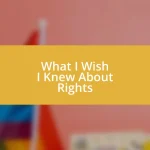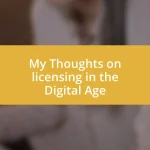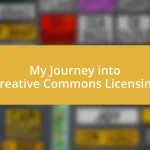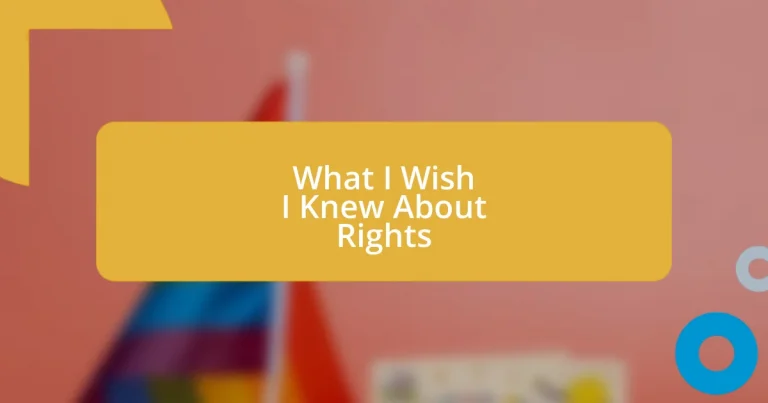Key takeaways:
- Understanding rights is deeply personal and requires advocacy, as many individuals face discrimination and may not recognize their rights until threatened.
- The historical development of rights, from the Magna Carta to the Universal Declaration of Human Rights, highlights the ongoing struggle for individual freedoms and societal progress.
- Awareness, education, and community support are crucial for protecting rights, enabling individuals to stand up for themselves and others effectively.
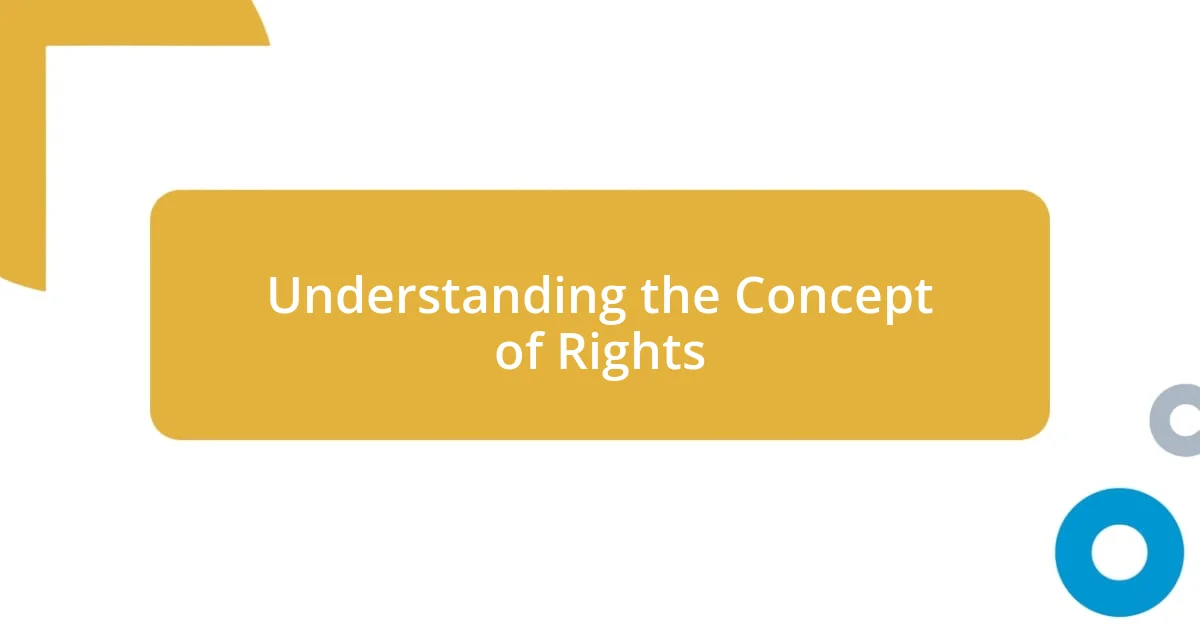
Understanding the Concept of Rights
Rights are often seen as inherent and universal; they shape our identity and influence how we interact with the world around us. I still remember the moment I first learned about human rights in college, sitting in a packed lecture hall, a sense of empowerment washing over me. I couldn’t help but wonder—how did I live so long without fully grasping these principles that protect my dignity and freedom?
In my experience, understanding rights requires not just knowledge but a personal connection to them. When I heard stories from friends who faced discrimination, it struck me how vital it is to advocate for these rights, as they impact people’s lives deeply. It raises important questions: What are my responsibilities in defending the rights of others? How often do we take our rights for granted, only realizing their significance when they are threatened?
At a deeper level, rights involve a moral and ethical framework that guides our actions. I recall a discussion with a close friend who felt that their rights were ignored in a job setting. That conversation opened my eyes to the everyday implications of rights—how they’re not just theoretical but very much alive in our daily interactions. It makes me reflect: Are we, as a society, doing enough to ensure that everyone’s rights are respected?
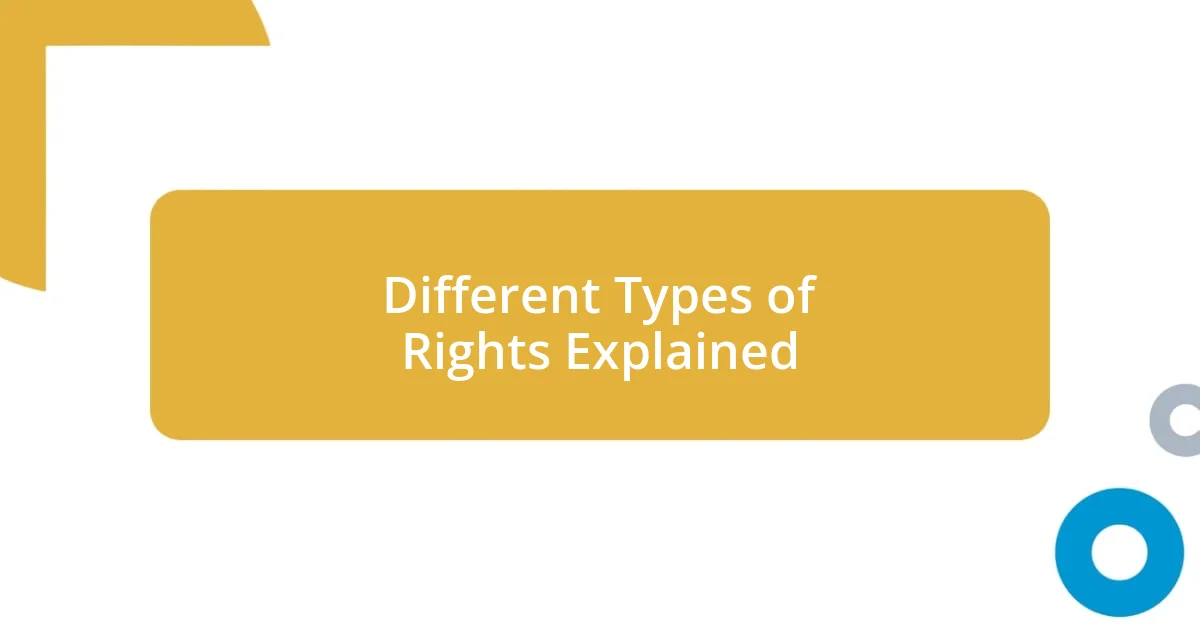
Different Types of Rights Explained
Different types of rights play a crucial role in shaping our society and individual experiences. For example, human rights are fundamental rights that every person possesses simply by being human. I remember a friend of mine who passionately participated in a local organization advocating for refugees. Through their efforts, it became clear just how essential it is that these rights are respected and upheld, especially for marginalized communities.
In contrast, civil rights specifically aim to protect individuals from discrimination. I think back to a community meeting I attended where activists passionately discussed the importance of the Civil Rights Act. The energy in the room was palpable; it was a vivid reminder that civil rights are not just abstract concepts—they have real-world implications that affect people daily, driving social progress and justice.
Lastly, there are legal rights, which are defined and enforced by law. These rights can vary significantly depending on jurisdiction. I’ve often reflected on how complicated legal rights can be, especially when I encountered situations where people were unaware of their legal protections. It was eye-opening to see how easily someone could navigate their rights if they had just a bit of guidance.
| Type of Right | Description |
|---|---|
| Human Rights | Inherent rights that every person possesses; universally recognized. |
| Civil Rights | Specific rights protecting individuals from discrimination; often enshrined in law. |
| Legal Rights | Rights defined and enforced by law; can vary by region. |
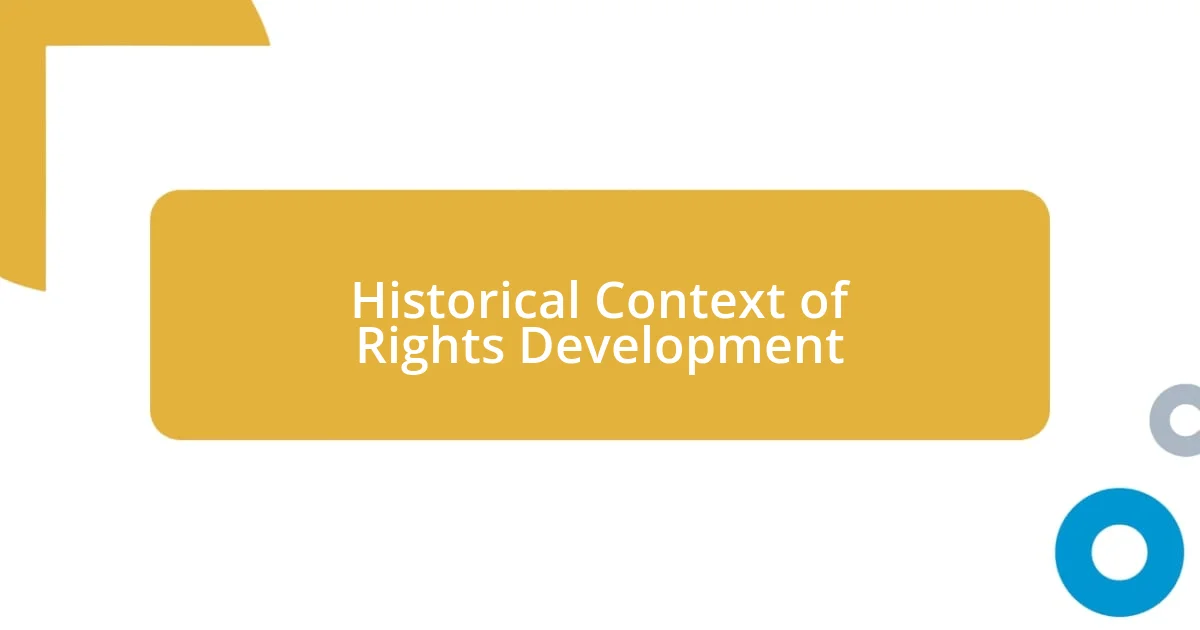
Historical Context of Rights Development
Rights have a fascinating history that traces back to ancient civilizations and their philosophies. I found it intriguing to discover how influential documents like the Magna Carta in 1215 laid the groundwork for modern concepts of individual rights. You can almost feel the weight of history when realizing how this document challenged the absolute power of the monarchy, planting seeds for democratic governance and rights recognition.
- The Enlightenment era sparked a shift in thinking, emphasizing reason and individualism.
- The American and French Revolutions were pivotal moments, declaring inalienable rights as central to governance.
- The Universal Declaration of Human Rights in 1948 represented a landmark global commitment to uphold fundamental rights for all.
Reflecting on these milestones, I often think about my own privileges and rights. It’s sobering to realize how many have fought—and continue to fight—for these freedoms. The emotional impact of understanding that our rights didn’t always exist, and required brave voices to be heard, reminds me of the importance of staying vigilant in protecting them today. Each step in this journey of rights development shaped current attitudes, compelling us to cherish and advocate for our freedoms.
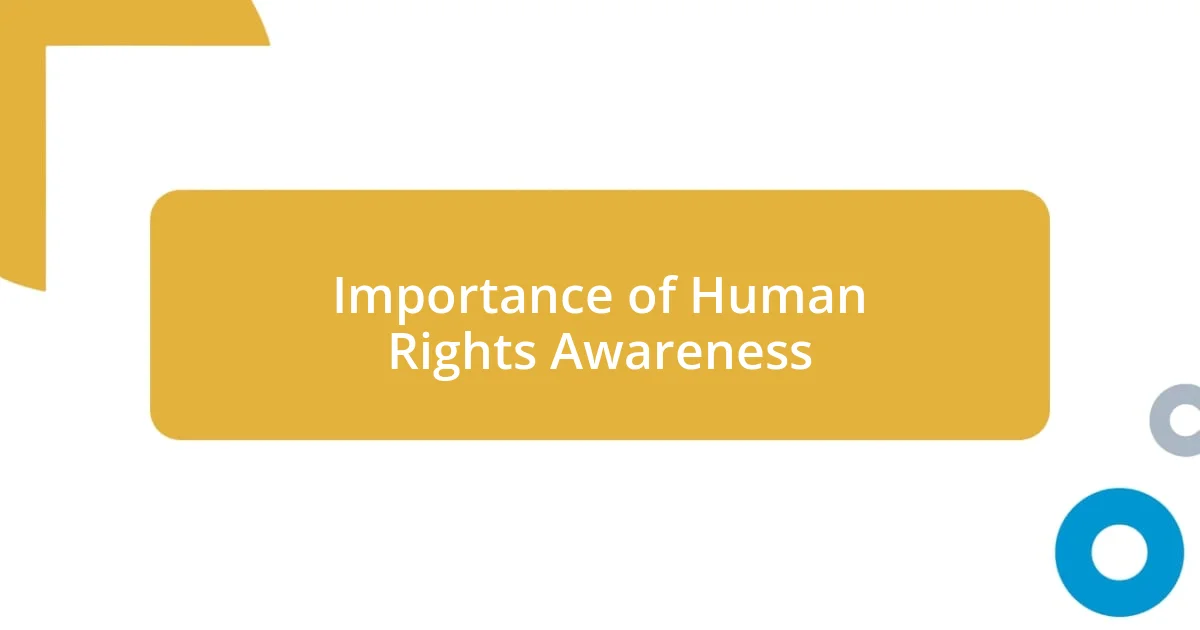
Importance of Human Rights Awareness
Awareness of human rights is pivotal for fostering a just society. When I volunteered at a local shelter, I saw firsthand how many individuals were unaware of their rights regarding housing and employment. It struck me hard—understanding these rights can change lives, providing people with the tools to stand up for themselves in difficult situations.
I’ve often pondered, how many injustices could be avoided if everyone had a basic understanding of human rights? During a community workshop I attended, someone shared a story about facing discrimination without knowing they could seek legal recourse. It was a sobering moment; I realized that educating ourselves about our rights isn’t just about knowledge—it’s about empowerment.
Moreover, human rights awareness can spark solidarity and advocacy. After attending a rally for human rights, I left feeling invigorated by the shared commitment to making the world a better place. I think it’s vital to recognize that each of us has a role in this journey. When we become informed, we can inspire others to join in, creating a ripple effect that strengthens our collective voice for justice.
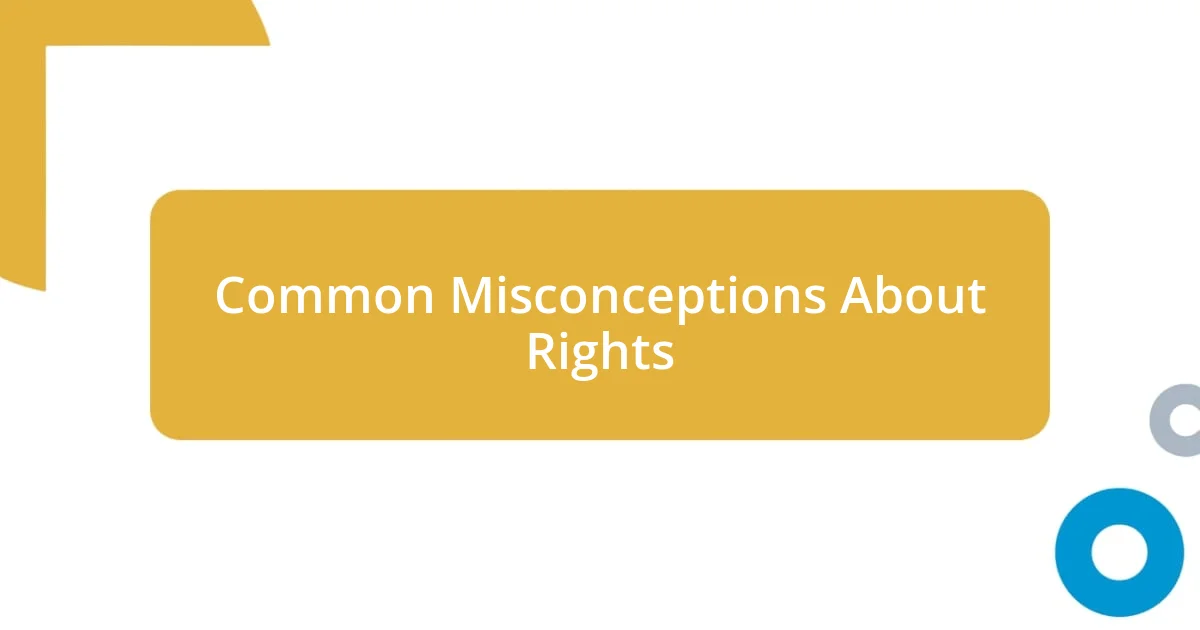
Common Misconceptions About Rights
There are several misconceptions that often cloud our understanding of rights. One common belief is that rights are automatically granted to everyone from birth. In reality, this isn’t the case in many parts of the world. I recall a conversation I had with a friend from a country where basic rights weren’t legally guaranteed. It was eye-opening to hear how her experiences contrasted with my own perceptions of rights as an inherent entitlement.
Another prevalent myth is that rights are static and don’t evolve over time. I remember attending a forum where speakers highlighted how movements such as those advocating for LGBTQ+ rights have contributed to significant changes in law and societal attitudes. This evolution is essential; it reminds us that advocacy and awareness can lead to more inclusive interpretations of rights. Don’t you find it fascinating how the understanding of rights can shift based on collective actions and values?
Lastly, some people think that acknowledging the rights of one group infringes on the rights of another. This notion can be frustrating, especially when I reflect on my volunteer work with marginalized communities. The more I learned, the clearer it became that advocating for one group’s rights often strengthens the rights landscape for everyone. It’s a powerful reminder that the fight for rights is not a zero-sum game but rather a shared journey towards greater equity and justice for all.
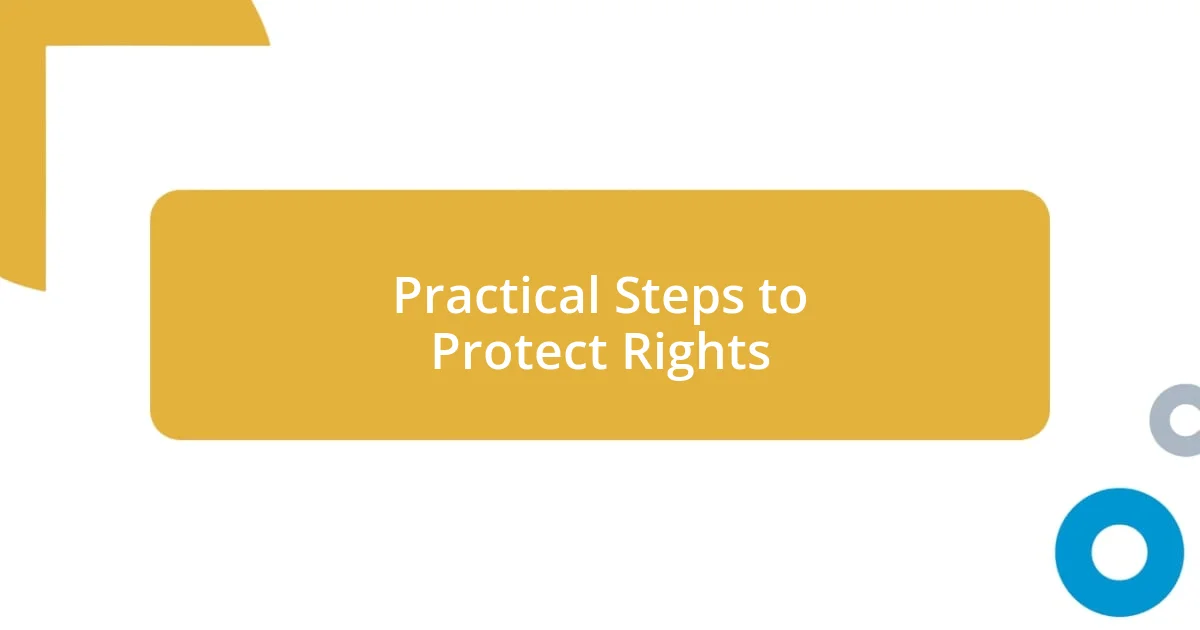
Practical Steps to Protect Rights
Taking practical steps to protect our rights is something that I’ve found can truly make a difference. For instance, I remember attending a workshop on personal safety where we learned about documentation—keeping records of incidents, conversations, and witnesses. It might sound tedious, but having that written proof can be a game changer when you need to stand up for yourself. How many times have we wished we had evidence to back our claims?
Another impactful step I’ve discovered is connecting with local advocacy groups. When I got involved in a community organization, I met people who faced similar challenges and gained valuable insights on navigating legal systems. The sharing of experiences in those spaces was incredibly empowering. Have you ever considered how community support can bolster individual rights? It’s astounding how a supportive circle can amplify voices that often go unheard.
Lastly, let’s not underestimate the power of education. I’ve taken courses focused on understanding legal rights, and I can’t express enough how enlightening it was. Learning about constitutional rights or local laws equips us with knowledge—an essential tool for today’s world. What if everyone had access to this kind of education? It could reshape how we protect ourselves and advocate for others.
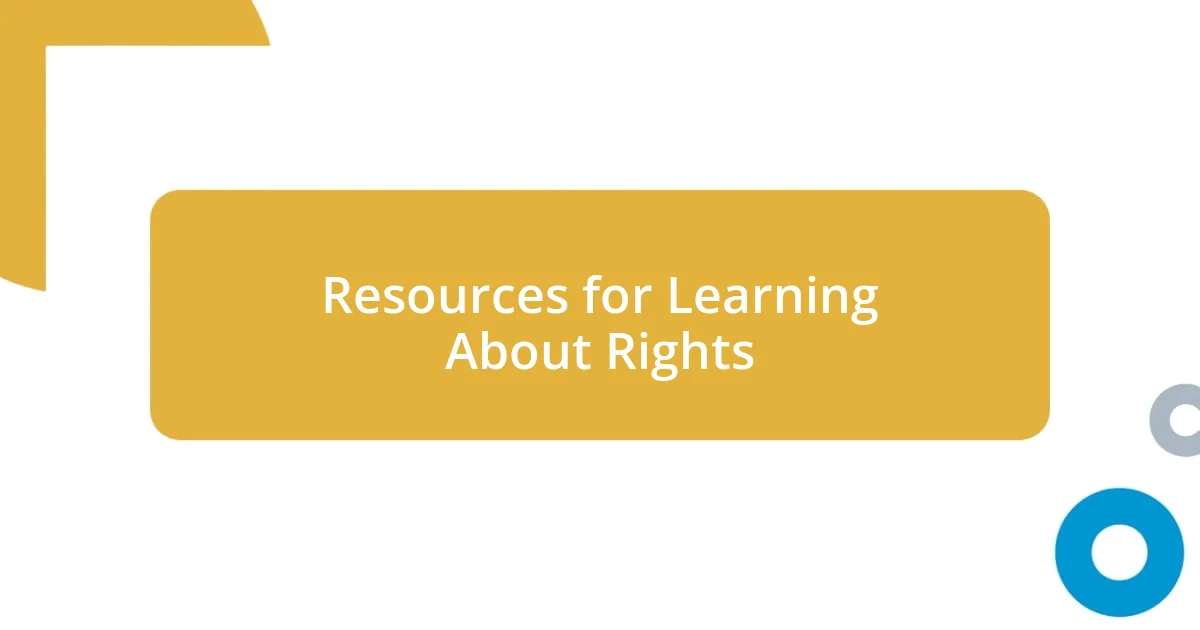
Resources for Learning About Rights
Understanding your rights is essential, and there are numerous resources available to deepen that knowledge. One resource I found particularly valuable was a local library’s legal resource section. I remember spending hours there, pouring over books and legal pamphlets that demystified complex concepts. It reminded me how approachable legal language can be when we take the time to explore it—have you ever felt more empowered just by learning something new?
Online platforms also offer incredible avenues for learning. I once participated in a webinar about civil rights where experts addressed current issues. Interacting with them in real-time was such an eye-opener; I realized how accessible these discussions can be. With just a few clicks, we can engage in meaningful conversations that shape our understanding. Isn’t it remarkable how technology connects us to knowledge and people who care about the same issues?
Lastly, community organizations often serve as frontline resources. My experience volunteering with a local advocacy group opened my eyes to the various workshops they offer, covering everything from workers’ rights to anti-discrimination laws. It was inspiring to witness firsthand how collective learning can transform personal lives. Have you explored your local resources? They can be a gateway to not just understanding rights but also joining a movement that resonates with your values.

